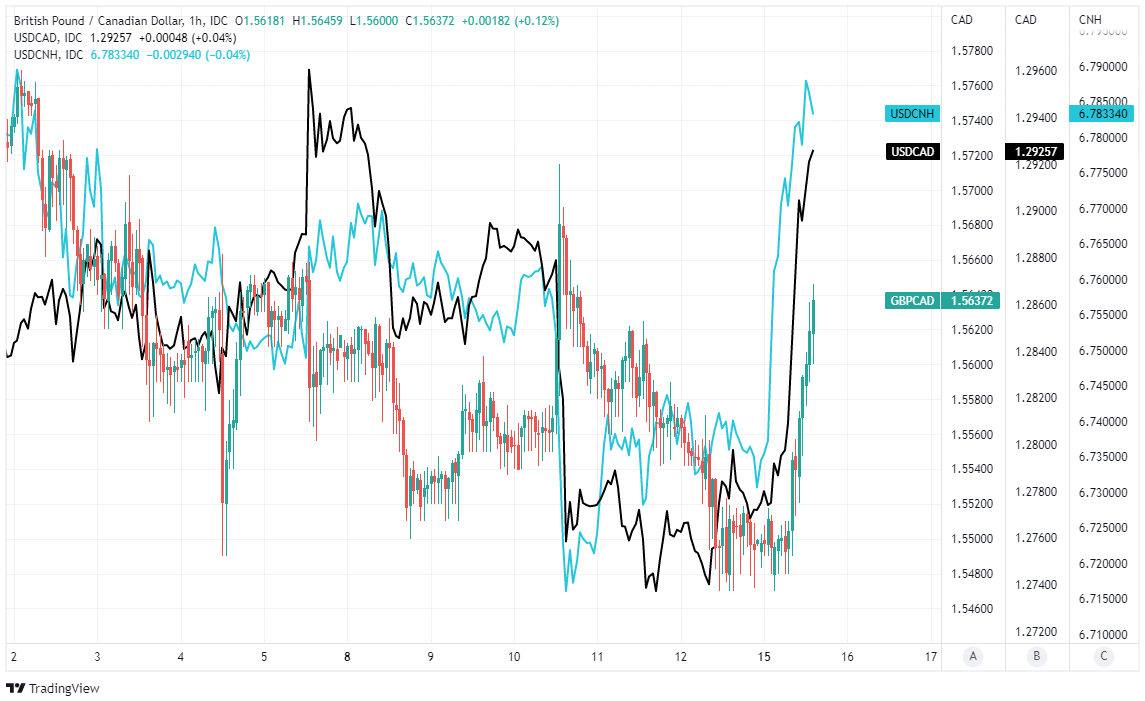GBP/CAD Week Ahead Forecast: Upside Risk Ahead
- Written by: James Skinner
-
- Risk of GBP/CAD’s rally extending into a retest of 1.58
- If Canada CPI moderation sees USD/CAD rise further
- Risk aversion & USD/CNH driving USD/CAD currently
- Response to any Canada or UK CPI decline uncertain

Image © Adobe Stock
The Pound to Canadian Dollar exchange rate rallied from August lows to open the new week but could climb further up ahead and as far as a short distance above the 1.58 handle if the Loonie builds on Monday’s declines in what will be a busy period for Canadian, UK and U.S. economic data.
Canada's Dollar tumbled on Monday alongside other currencies with high sensitivities to risk appetite, commodity prices and changes in the global growth outlook after People’s Bank of China (PBoC) announced a surprise reduction of interest rates in response to worrisome local economic data.
Renminbi losses saw the Dollar-Renminbi pair climb notably in price action that appeared to lift the U.S. currency against a range of counterparts and especially those with economic linkages to commodity prices, prompting a sharp rally in USD/CAD and GBP/CAD.
But the Loonie and Sterling must now each also navigate a series of domestic economic event risks loitering along the path ahead but in light of the above it’s possible, if not likely that the directional risk for GBP/CAD is now tilting a bit more to the upside than it is to the downside.
“This is the last official CPI reading before the September rate decision,” says Bipan Rai, North American head of FX strategy at CIBC Capital Markets.

“While it doesn’t necessarily mean that the decision will be set in stone after the release (there are other data points ahead of then after all), it will go a long way in determining how CAD assets trade in the lead up to the decision for sure,” Rai said on Monday while tipping USD/CAD to rise.
With the correlation between GBP/CAD and USD/CAD flipping to positive on Monday, much about the performance of the Pound to Canadian Dollar rate may well depend this week on whether the rally in USD/CAD continues, and this is something that is likely to be determined by Canadian economic data.
“Inflation momentum likely slowed in July as global commodity prices fell-mirroring the drop in US inflation. RBC Economics estimates that headline July CPI (Tuesday) slowed to 7.7% y/y, down from 8.1% in June,” says Alvin Tan, head of Asia FX strategy at RBC Capital Markets.
“Inflation nonetheless remains much too high, and isn't likely to return sustainably to the BoC's target levels without the economy cooling. Our economists expect a 75bps hike in September (mkt pricing +59bps),” Tan and colleagues said in a Monday research briefing.
Canadian inflation data will be watched closely on Tuesday for signs of whether prices will be likely to follow their U.S. counterparts lower and that in turn will be a key determinant of the outlook for Bank of Canada (BoC) interest rate policy.
“The Canadian dollar did not fully catch up to oil prices on the upside. Now that crude is rolling over, CAD remains vulnerable, unless the dollar continues to stage a meaningful decline. Canadian data has been rather mixed over the last month,” says Chester Ntonifor, chief FX strategist at BCA Research.
“The BoC raised rates 100bps in July, the biggest interest rate increase in one meeting among the G10. Unless the labor market continues to soften, the BoC will continue to focus on inflation, which means more rate hikes are forthcoming,” Ntonifor said of the Canadian Dollar outlook last week.
Canada’s inflation numbers will be released a day ahead of July data from the UK and this time out there is uncertainty about how the market would be likely to respond to up or downside surprises due to the impact that recent trends have had on BoC and Bank of England (BoE) policy stances.
Persistent uptrends have taken inflation to repeated multi-decade highs in the UK and Canada, pushing the BoC and BoE into the position where they could have to drive their economies into a rut in order to contain price pressures, hence uncertainty about the market response to the data this week.
“Energy price declines (gasoline) were a factor for the unchanged month on month reading in the US CPI data for July. Local gas prices dropped by a similar amount as US pump prices in July but gasoline has a slightly higher weighting in US CPI (just under 6%) than Canada (4.6%) so the impact may be slightly less,” says Shaun Osborne, chief FX strategist at Scotiabank.
“Price pressures in Canada appear relatively sticky and the Bank of Canada is mounting a clear campaign to explain its policy tightening moves, even as Canadians are starting to feel the squeeze from tighter budgets. A short Twitter thread from the Bank this week sounded resolute in its determination to restore price stability,” Osborne and colleagues warned in a Friday research briefing.
Typically, currencies like Sterling and the Loonie have tended to move in the direction of the inflation surprise and seemingly because of the positive correlation with benchmark interest rates, but rising rates may no longer be all that they once were for currencies.
There is a risk, as a result of this, that GBP/CAD could rise in response to an upside inflation surprise in Canada and fall in response to the same event in the UK and vice versa. That might be positive for GBP/CAD given UK inflation has repeatedly shown signs of losing momentum over recent months.

